Index relies entirely on the support of donors and readers to do its work.
Help us keep amplifying censored voices today.
In support of Salman Rushdie, Index on Censorship, English PEN, Article 19, and Humanists UK have invited writers and free speech champions to read excerpts from Rushdie’s writing. Through these videos we invite you to explore Rushdie’s work. We also encourage you to reflect on the significant risks writers across the world face.
On 12 August 2022, novelist Salman Rushdie was stabbed on stage as he was preparing to give a lecture at Chautauqua Institution in New York. The attack has been a shocking reminder of what censorship looks like in practice.
Ayatollah Khomeini issued a fatwa against Rushdie in 1989 following the publication of his novel The Satanic Verses. Rushdie has survived several assassination attempts and death threats. Despite the persistent intimidation, Rushdie continues to write, and he is an outspoken defender of freedom of expression.
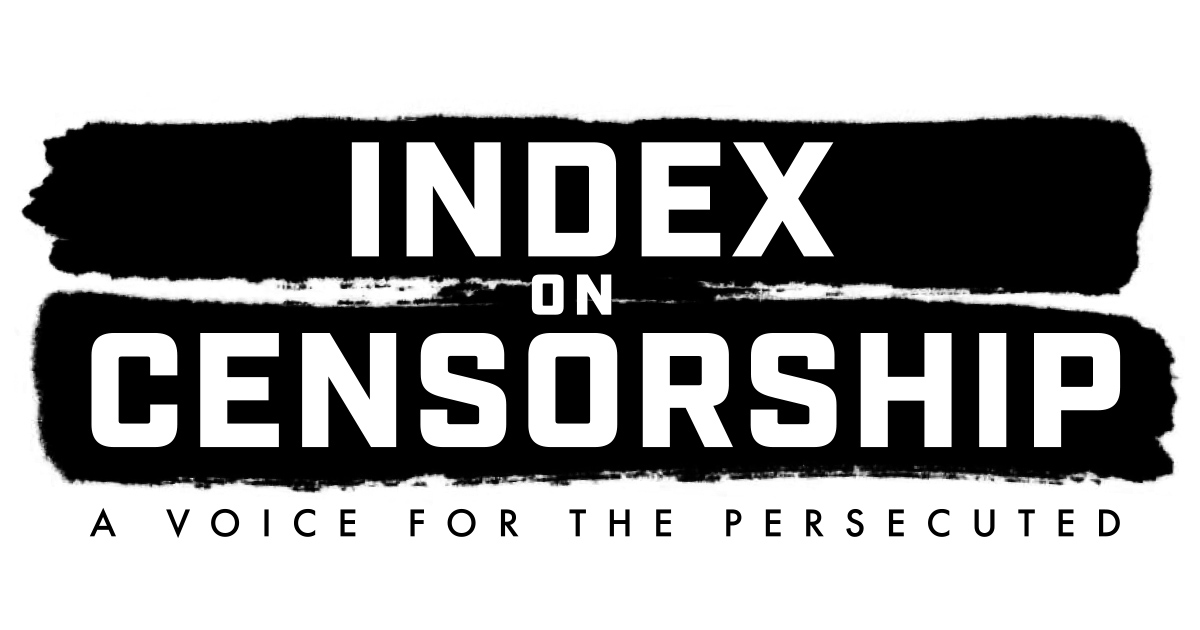
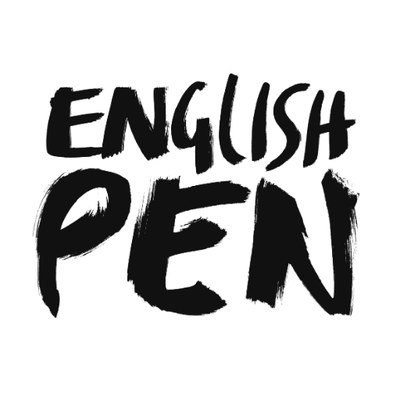
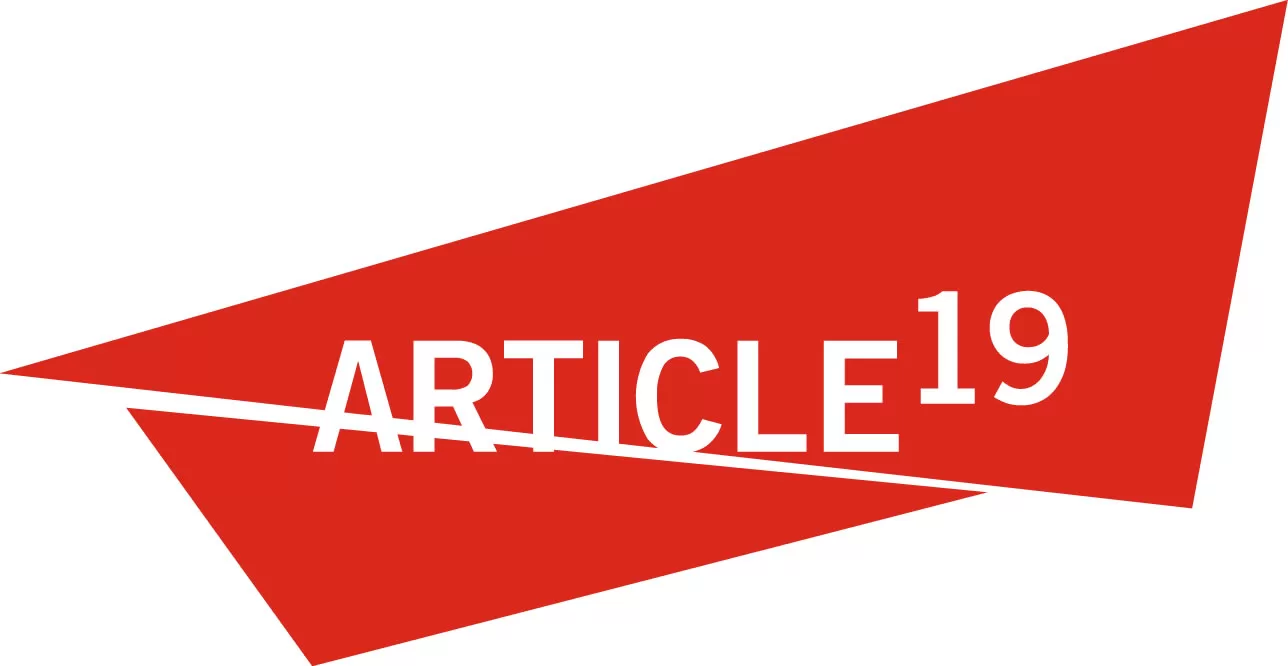

On 12 August 2022, Salman Rushdie, the author of the book The Satanic Verses, was attacked as he prepared to give a lecture at the Chautauqua Institution, an arts and education centre in New York state. He was stabbed in the neck, face and abdomen and remains in a critical condition in hospital. His family issued a statement saying that despite his "life-changing injuries" being severe, "his usual feisty and defiant sense of humour remains intact".
Index on Censorship has long been a supporter of Salman Rushdie and fully support his right to freedom of expression, as we do for other authors and artists. Supporting those who are silenced, threatened and attacked is at the heart of Index's 50-year-long history. Index condemns this cowardly attack on the author.Index CEO Ruth Smeeth said, "We are still in shock after the brutal attack on Salman Rushdie last week. While we are relieved to hear he survived, we know the path to recovery will be long and our thoughts go out to him and his family. We consider Salman part of the Index community. We were instrumental in the campaign against the fatwa and Salman has in turn written regularly for our magazine. He is a fierce defender of free expression and his writing, which is beloved by so many, is a testament to the power of words themselves."
She added, "The violence committed against him is an awful reminder that the fight for freedom of expression continues and we are as committed as ever to campaigning for a world in which acts such as these never happen.
We call on all others who believe in his right not to be silenced to leave a message of support, using the form below, which we will share with him and publish here. You can also sign up to receive our weekly newsletter to receive updates on the campaign. It also features news relating to freedom of expression issues around the world. You do not need to sign up to this to send a message of support.

Salman Rushdie. Credit: Fronteiras do Pensamento
On 12 August 2022, Salman Rushdie, the author of the book The Satanic Verses, was attacked as he prepared to give a lecture at the Chautauqua Institution, an arts and education centre in New York state.
Index on Censorship has supported Rushdie's right to express himself ever since he came into the public eye more than three decades ago.
On 14 February 1989 Iran's Ayatollah Khomeini issued a fatwa ordering Muslims to execute Rushdie over the publication of The Satanic Verses, along with anyone else involved with the novel.
Published in the UK in 1988 by Viking Penguin, the book was met with widespread protest by those who accused Rushdie of blasphemy and unbelief. Death threats and a $6 million bounty on the author’s head saw him take on a 24-hour armed guard under the British government’s protection programme.
The book was soon banned in a number of countries, from Bangladesh to Venezuela, and many died in protests against its publication, including on 24 February when 12 people lost their lives in a riot in Bombay, India. Explosions went off across the UK, including at Liberty’s department store, which had a Penguin bookshop inside, and the Penguin store in York.
Book store chains including Barnes and Noble stopped selling the book, and copies were burned across the UK, first in Bolton where 7,000 Muslims gathered on 2 December 1988, then in Bradford in January 1989. In May 1989 between 15,000 to 20,000 people gathered in Parliament Square in London to burn Rushdie in effigy.
In October 1993, William Nygaard, the novel's Norwegian publisher, was shot three times outside his home in Oslo and seriously injured.
Rushdie came out of hiding after nine years, but as recently as February 2016, money has been raised to add to the fatwa, reminding the author As that for many the Ayatollah's ruling still stands.
As his supporters around the world, including Index, pray for a positive outcome, we highlight key articles from our archives from before, during and after the issue of the fatwa, including two from Rushdie himself.
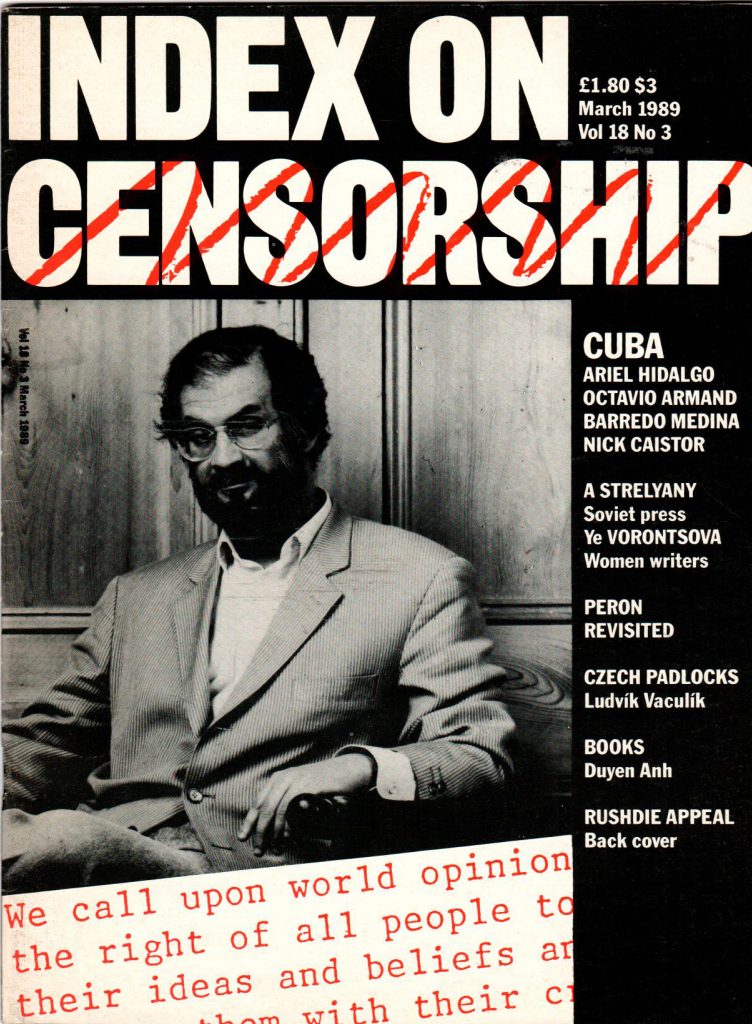
Cuba today, the March 1989 issue of Index on Censorship magazine.
World statement by the international committee for the defence of Salman Rushdie and his publishers
March 1989, vol. 18, issue 3
On 14 February the Ayatollah Khomeini called on all Muslims to seek out and execute Salman Rushdie, the author of The Satanic Verses, and all those involved in its publication. We, the undersigned, insofar as we defend the right to freedom of opinion and expression as embodied in the Universal Declaration of Human Rights, declare that we also are involved in the publication. We are involved whether we approve the contents of the book or not. Nonetheless, we appreciate the distress the book has aroused and deeply regret the loss of life associated with the ensuing conflict.

Islam & human rights, the May 1989 issue of Index on Censorship magazine.
Amir Taheri
May 1989, vol. 18, issue 5
'What Rushdie has done, as far as Muslim intellectuals are concerned, is to put their backs to the wall and force them to make the choice they have tried to avoid for so long'. Last year, when poor old Mr Manavi filled in his Penguin order form for 10 copies of Salman Rushdie's third novel, The Satanic Verses, he could not have imagined that the book, described by its publishers as a reflection on the agonies of exile, would provoke one of the most bizarre diplomatic incidents in recent times. Mr Manavi had been selling Penguin books in Tehran for years. He had learned which authors to regard as safe and which ones to avoid at all costs.

Islam & human rights, the May 1989 issue of Index on Censorship magazine.
Wole Soyinka
May 1989, vol. 18, issue 5
This statement is not, of course, addressed to the Ayatollah Khomeini who, except for a handful of fanatics, is easily diagnosed as a sick and dangerous man who has long forgotten the fundamental tenets of Islam. It is useful to address oneself, at this point, only to the real Islamic faithful who, in their hearts, recognise the awful truth about their erratic Imam and the threat he poses not only to the continuing acceptance of Islam among people of all religions and faiths but to the universal brotherhood of man, no matter the differing colorations of their piety. Will Salman Rushdie die? He shall not. But if he does, let the fanatic defenders of Khomeini's brand of Islam understand this: The work for which he is now threatened will become a household icon within even the remnant lifetime of the Ayatollah. Writers, cineastes, dramatists will disseminate its contents in every known medium and in some new ones as yet unthought of.
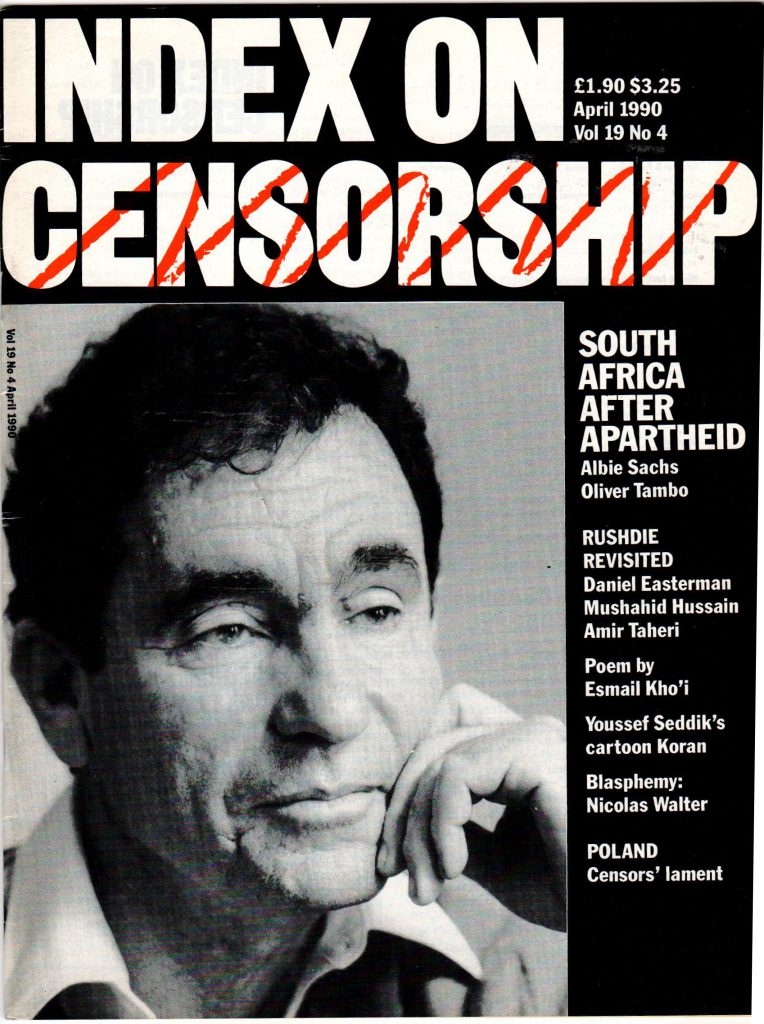
South Africa after Apartheid, the April 1990 issue of Index on Censorship magazine.
Reflections on an invalid fatwah
Amir Taheri
April 1990, vol. 19, issue 4
Broadly speaking, three predictions were made. The first was that Khomeini's attempt at exporting terror might goad world public opinion into a keener understanding of Iran's tragedy since the Islamic Revolution of 1979. The fact that the Ayatollah had executed thousands of people, including many writers and poets since his seizure of power in Tehran had provoked only mild rebuke from Western governments and public opinion. With the fatwa against Rushdie, we thought the whole world would mobilise against the ayatollah, turning his regime into an international pariah. Nothing of the kind happened, of course, and only one country, Britain, closed its embassy in Tehran - and that because the mullahs decided to sever.diplomatic ties. In the past twelve months Federal Germany and France have increased their trade with the Islamic Republic to the tune of II and 19 per cent respectively. The EEC countries and Japan have, in the meantime, provided the Islamic Republic with loans exceeding £2,000 million. The stream of European and Japanese businessmen and diplomats visiting Tehran turned into a mini-flood after Khomeini's death last June.

South Africa after Apartheid, the April 1990 issue of Index on Censorship magazine.
Salman Rushdie and political expediency
Adel Darwish
April 1990, vol. 19, issue 4
When I reviewed Salman Rushdie's Satanic Verses in September 1988, it never crossed my mind to make any reference to possible offence to Muslim readers, let alone to anticipate the unprecedented international crisis generated in the months that followed. I do not think I was naive - as an LBC radio reporter suggested when she interviewed me at the first public reading from The Satanic Verses in June 1989. On the contrary, I can claim more than many that I am able to understand what Mr Rushdie was trying to say in his book, and the way the crisis has developed. Like Mr Rushdie, I am a British writer, born to a Muslim family. Born in Egypt, I was educated and am employed in Britain, and have been preoccupied and engaged, mainly in the 1960s and 1970s, with the issues that Mr Rushdie has fought for and with which he seemed to be very much concerned in his book.
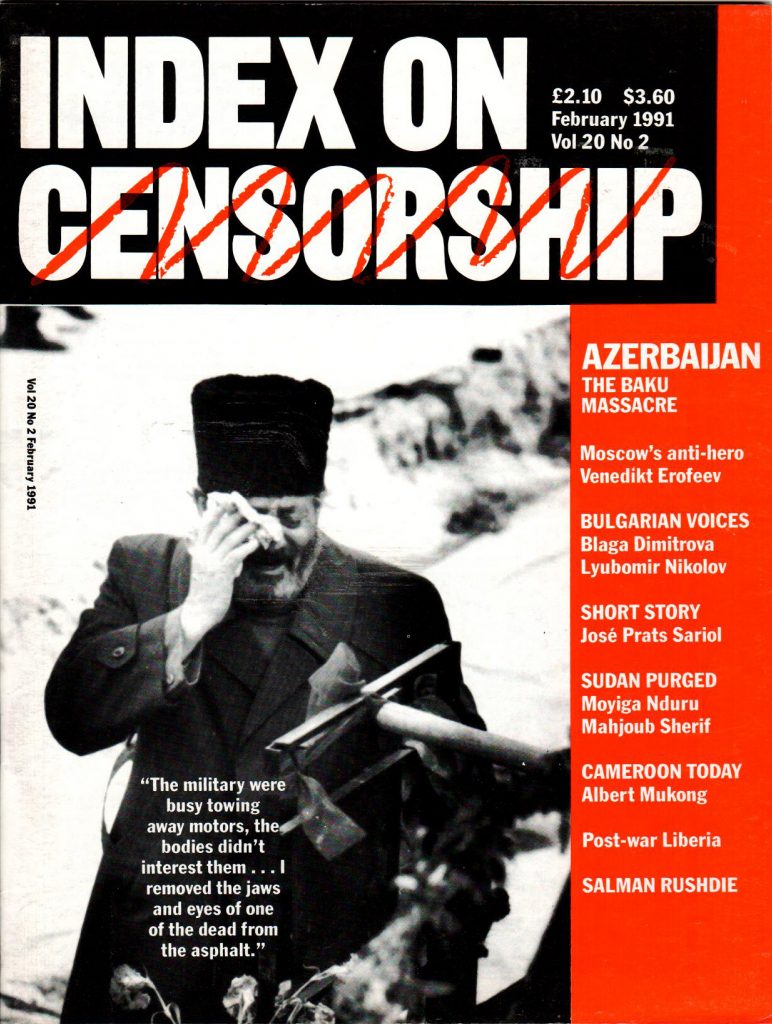
Azerbaijan, the February 1991 issue of Index on Censorship magazine.
Salman Rushdie
February 1991, vol. 20, issue 2
A man's spiritual choices are a matter of conscience, arrived at after deep. reflection and in the privacy of his heart. They are not easy matters to speak of publicly. I should like, however, to say something about my decision to affirm the two central tenets of Islam — the oneness of God and the genuineness of the prophecy of the Prophet Muhammad —and thus to enter into the body of Islam after a lifetime spent outside it. Although I come from a Muslim family background, I was never brought up as a believer, and was raised in an atmosphere of what is broadly known as secular humanism. I still have the deepest respect for these principles. However, as I think anyone who studies my work will accept, I have been engaging more and more with religious belief, its importance and power, ever since my first novel used the Sufi poem Conference of the Birds by Farid ud-din Attar as a model. The Satanic Verses itself, with its portrait of the conflicts between the material and spiritual worlds, is a mirror of the conflict within myself.
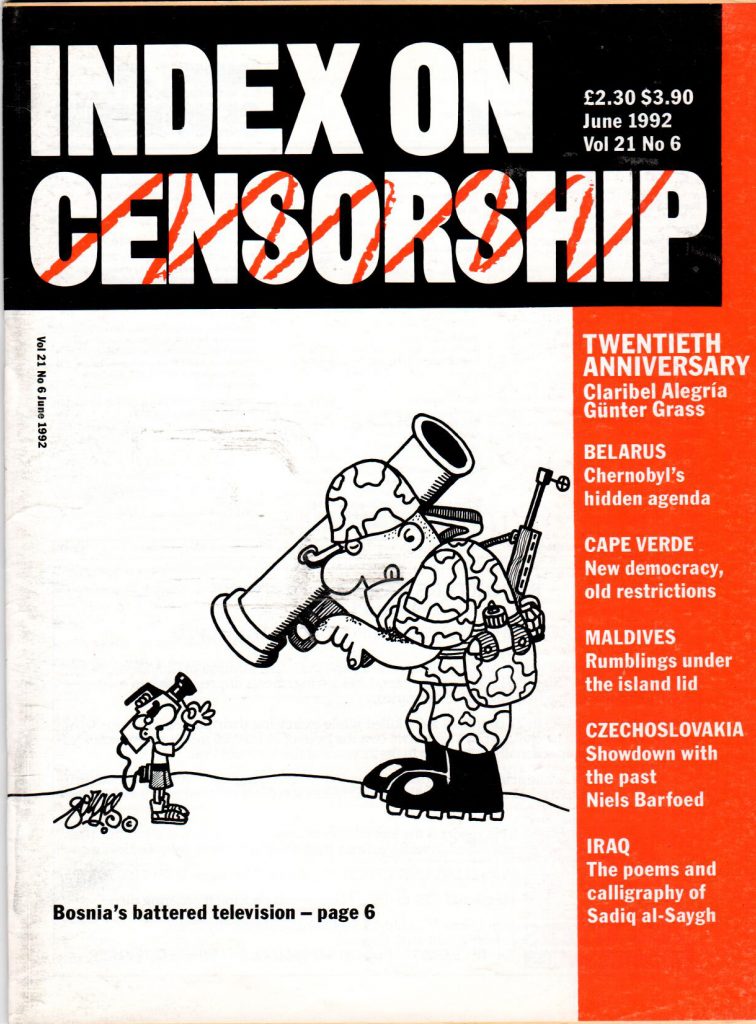
20th Anniversary: Reign of terror, the June 1992 issue of the Index on Censorship magazine.
Gunter Grass
June 1992, vol. 21, issue 6
When George Orwell returned from Spain in 1937, he brought with him the manuscript of Homage to Catalonia. It reflected the experiences he had gathered during the Civil War. At first, he was unable to find a publisher because a multitude of influential, left-wing intellectuals had no wish to acknowledge its shocking observations. They did not want to accept the Stalinist terror, the systematic liquidation of anarchists, Trotskyists and left-wing socialists. Orwell himself only narrowly escaped this terror. His stark accusations contradicted a world image of a flawless Soviet Union fighting against Fascism. Orwell's report, this onslaught of terrible reality, tarnished the picture-book dream of Good and Evil. A year later, a bourgeois Western publisher brought out Homage to Catalonia; in the areas of Communist rule, Orwell's works - among them the bitter Spanish truth - were banned for half a century. The minister responsible for state security= in the German Democratic Republic, right to its end, was Erich Mielke. During the Spanish Civil War, he was a member of the Communist cadre to whom purge through liquidation became commonplace. A fighter for Spain with an extraordinary capacity for survival.
Read the full article[/vc_column_text][/vc_column][/vc_row][vc_row][vc_column][vc_column_text]

Russia's choice, the November-December 1993 issue of Index on Censorship magazine.
The Rushdie affair: Outrage in Oslo
Hakon Harket
November 1993, vol. 22, issue 10
The terrorist state of Iran must face the consequences of refusing to lift the fatwa that condemns Salman Rushdie, and those associated with his work, to death. When someone, in accordance with the express order of the fatwa, attempts to murder one of the damned, the obvious consequence is that Iran must be held responsible for the crime it has called for, at least until there is conclusive proof that no connection exists. The shooting of William Nygaard has reminded the Norwegian public of what the Rushdie affair is really about: life and death; the abuse of religion; the fiction of a free mind. This war of terror against freedom of speech is not one we can afford to lose. Since the nightmare clearly will not disappear of its own accord, it must be engaged head-on.

New censors, the March 1996 issue of Index on Censorship magazine.
March 1996, vol. 25, issue 2
This statement is not, of course, addressed to the Ayatollah Khomeini who, except for a handful of fanatics, is easily diagnosed as a sick and dangerous man who has long forgotten the fundamental tenets of Islam. It is useful to address oneself, at this point, only to the real Islamic faithful who, in their hearts, recognise the awful truth about their erratic Imam and the threat he poses not only to the continuing acceptance of Islam among people of all religions and faiths but to the universal brotherhood of man, no matter the differing colorations of their piety. Will Salman Rushdie die? He shall not. But if he does, let the fanatic defenders of Khomeini's brand of Islam understand this: The work for which he is now threatened will become a household icon within even the remnant lifetime of the Ayatollah. Writers, cineastes, dramatists will disseminate its contents in every known medium and in some new ones as yet unthought of.
The Rushdie affair: Outrage in Oslo
Hakon Harket
November 1993, vol. 22, issue 10
The terrorist state of Iran must face the consequences of refusing to lift the fatwa that condemns Salman Rushdie, and those associated with his work, to death. When someone, in accordance with the express order of the fatwa, attempts to murder one of the damned, the obvious consequence is that Iran must be held responsible for the crime it has called for, at least until there is conclusive proof that no connection exists. The shooting of William Nygaard has reminded the Norwegian public of what the Rushdie affair is really about: life and death; the abuse of religion; the fiction of a free mind. This war of terror against freedom of speech is not one we can afford to lose. Since the nightmare clearly will not disappear of its own accord, it must be engaged head-on.

New censors, the March 1996 issue of Index on Censorship magazine.
March 1996, vol. 25, issue 2
This statement is not, of course, addressed to the Ayatollah Khomeini who, except for a handful of fanatics, is easily diagnosed as a sick and dangerous man who has long forgotten the fundamental tenets of Islam. It is useful to address oneself, at this point, only to the real Islamic faithful who, in their hearts, recognise the awful truth about their erratic Imam and the threat he poses not only to the continuing acceptance of Islam among people of all religions and faiths but to the universal brotherhood of man, no matter the differing colorations of their piety. Will Salman Rushdie die? He shall not. But if he does, let the fanatic defenders of Khomeini's brand of Islam understand this: The work for which he is now threatened will become a household icon within even the remnant lifetime of the Ayatollah. Writers, cineastes, dramatists will disseminate its contents in every known medium and in some new ones as yet unthought of.

Tolerance and the intolerable, the May 1994 issue of Index on Censorship magazine
Salman Rushdie
May 1994, vol. 23, issue 1-2
When the Balkans War broke out, Rushdie had never been to Sarajevo, but felt that he belonged to it. He imagined a Sarajevo of the mind, whose ruination and torment exiled everyone.
He wrote: "Sarajevo's truth is that its citizens, who reject definition by religion or confession, who wish to be simply Bosnians, have for their pains been labelled by the outside world as 'Muslims'. It is instructive to imagine how things might have gone in former Yugoslavia if the Bosnians had been Christians and the Serbs had been Muslims, even Muslims 'in name only'. Would Europe have supported a 'Serbian Muslim' carve-up of the defunct state? It's only a guess, but I guess that it would not. Which being true, it must also be true that the 'Muslim' tag is part of the reason for Europe's indifference to Sarajevo's fate."
Peter Mayer
December 2008, vol. 37, issue 4
As publisher of The Satanic Verses, Peter Mayer was on the front line. He writes here for the first time about an unprecedented crisis:
Penguin published Salman Rushdie's The Satanic Verses six months before Ayatollah Khomeini issues his fatwa. When we decided to continue publishing the novel in the aftermath, extraordinary pressures were focused on our company, based on fears for the author's life and for the lives of everyone at Penguin around the world. This extended from Penguin's management to editorial, warehouse, transport, administrative staff, the personnel in our bookshops and many others. The long-term political implications of that early signal regarding free speech in culturally diverse societies were not yet apparent to many when the Ayatollah, speaking not only for Iran but, seemingly, for all of Islam, issued his religious proclaimation.
Bernard-Henri Lévy
December 2008, vol. 37, issue 4
As publisher of The Satanic Verses, Peter Mayer was on the front line. He writes here for the first time about an unprecedented crisis:
Salman Rushdie was not yet the great man of letters that he has since become. He and I are, though, pretty much the same age. We share a passion for India and Pakistan, as well as the uncommon privilege of having known and written about Zulfikar Ali Bhutto (Rushdie in Shame; I in Les Indes Rouges), the father of Benazir, former prime minister of Pakistan, executed ten years earlier in 1979 by General Zia. I had been watching from a distance, with infinite curiosity, the trajectory of this almost exact contemporary. One day, in February 1989, at the end of the afternoon, as I sat in a cafe in the South of France, in Saint Paul de Vence, with the French actor Yves Montand, sipping an orangeade, I heard the news: Ayatollah Khomeini, himself with only a few months to live, had just issued a fatwa, in which he condemned as an apostate the author of The Satanic Verses and invited all Muslims the world over to carry out the sentence, without delay.
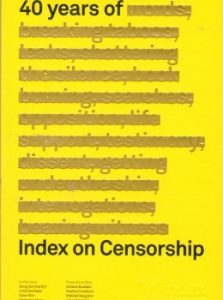
40 years of Index on Censorship March 2012
Salman Rushdie
March 2012, vol. 41, issue 1
Salman Rushdie’s first memories of censorship are cinematic: screen kisses brutalised by prudish scissors which chopped out the moments of actual contact. (Briefly, before comprehension dawned, he wondered if that were all there was to kissing, the languorous approach and then the sudden turkey-jerk away.) The effect was usually somewhat comic, and censorship still retains, in contemporary Pakistan, a strong element of comedy. When the Pakistani censors found that the movie El Cid ended with a dead Charlton Heston leading the Christians to victory over live Moslems, they nearly banned it until they had the idea of simply cutting out the entire climax, so that the film as screened showed El Cid mortally wounded. El Cid dying nobly, and then it ended. Muslims 1, Christians 0.

The winter 2013 issue of Index on Censorship magazine.
Defending the right to be offended
Samira Ahmed
December 2013, vol. 42, issue 4
The tensions between freedom of speech and religious belief remain acute – and they are systematically exploited by political groups of all stripes, from the English Defence League to radical Islamists who threaten to disrupt the repatriation of dead British soldiers at Wootton Bassett. The story consistently makes the headlines. The idea that there is an Islamist assault on British freedoms and values is widespread.
The Muslim campaign against Salman Rushdie’s The Satanic Verses in 1988 was the crucial moment in all this. It forced writers and artists from an Asian or Muslim background, whether they defined themselves that way or not, to take sides. They had to declare loyalty – or otherwise – to the offended.
At four in the afternoon on 16 April 2022, Iranian documentary filmmaker Gelareh Kakavand was at home when there was an insistent hammering at the door.
“There were five security police officers accompanied by a woman. They threatened to break it if it didn’t open immediately,” Kakavand told Index.
“They locked me in a room, put a camera in front of me, and started searching the house. When I protested that this was illegal to search my house and confine me in the room, they threatened to arrest and beat me.”
After the search of her home, which doubled up as her film studio, they confiscated Kakavand’s camera, camcorder and mobile phone.
Across the city at around the same time, Kakavand’s fellow filmmaker Vahid Zarezade returned home to find his door broken down.
“Agents had stormed my residence in my absence,” said Zarezade in an interview with Index. “The intelligence and security officers had told my landlord that the occupant of the house was engaged in ‘fraud and embezzlement’.”
The couple were then taken to one of Iran’s intelligence ministry buildings and interrogated, accompanied by threats, obscenities and insults.
Their work in documentaries – which they like to refer to as artivism – had always attracted unwanted attention from the authorities.
“During our career, we have made films about political prisoners such as Abbas Amir-Entezam, Mohammad Ali Amouei and Jila Bani Yaghoub, and the problems and sufferings of life and education among Baha'is in Iran. We also covered Keyvan Emamverdi’s case, documenting cases of sexual harassment and rape, and the emergence of the Iranian #metoo movement,” said Zarezade.
“As a result, we faced security, professional, and even financial and livelihood issues. Because of a film we made about the removal of paintings in the Museum of Contemporary Art of Iran we were handed a two-year suspended sentence and fined. We were also threatened many times for our film about Entezam. I was also imprisoned for one of the documentaries I worked on,” he said.
They were threatened verbally and had contracts cancelled for refusing to bow down to the authorities.
It soon became clear that the violent April raids related to a documentary they had started making two years earlier called White Torture, based on the book of the same name by human rights defender Narges Mohammadi.
White Torture features hard-hitting accounts of torture and sexual and physical humiliation faced by prisoners in Iran, particularly those who follow the Baha'i faith, the country’s second-most followed religion after Islam. The name refers to psychological torture relating to the extreme sensory deprivation and isolation of solitary confinement.
After they were released from interrogation but still fearing for their lives, Kakavand and Zarezade made the difficult decision to flee the country, prompted by the re-arrest and imprisonment of Mohammadi.
“We were worried the security forces might have gotten hold of the hard drives that contained videos and human rights documents, so we decided to leave Iran to make the pressure less on the members of the group as well as our families,” said Zarezade.
“We left Iran in order to finish the film and to ensure the narrators would remain secure and the accounts of prisoners would be preserved.”
Index spoke to Zarezade at an undisclosed location as the pair decided on their next moves.
--
Vahid Zarezade has been fascinated by the world of cinema since childhood.
“Despite my family’s disagreement, my first and only choice was to study cinema at university. Gradually, I started getting more interested in documentaries,” he said. “Society and my surroundings, with their cruelty and injustice, made the poetic and dreamlike aspect of cinema seem unreachable and impractical. Through documentaries I could intertwine concrete reality with the world of cinema.”
Zarezade soon began collaborating with Gelareh Kakavand on documentary work.
“Gelareh is a reflection of an egalitarian and demanding artist. More than being a filmmaker, she tries to create inner reflections and experiments. For example, in a film project about Iran’s mandatory hijab, she was one of those who used to walk the streets without a hijab many years ago. For many people, this was very inspiring.”
He believes that making films in Iran is not difficult but that the problems come later.
“What is difficult is the supervision and censorship that is applied to every cultural product and not only films, and this exhausts the artists,” he said. “The security system very noticeably monitors the artistic community of Iran and threatens them in different ways.”
Zarezade says filming White Torture was inevitable. “It was not me who chose to film this documentary, it was White Torture that chose me.”
“I was imprisoned years ago because of making a documentary which was never completed.
“Prison had a great impact on my life and my choices. During those years, I became acquainted with different people and thoughts. Throughout all those years, I endeavoured to highlight this both directly and indirectly in my projects. After getting to know Narges Mohammadi and becoming aware of the book she was writing, White Torture, I suggested making a documentary simultaneously.”
White Torture includes an interview with fellow Iranian filmmaker Jafar Panahi, who was sentenced to six years in prison in July. In the footage, Panahi and his lawyer go to court to complain against solitary confinement.
Zarezade believes the White Torture, which was released in spring 2022 White Torture and won an award at the Geneva Human Rights Film Festival, shines a strong light on what is truly happening in Iran.
“For years, the Iranian regime claims not to have any political prisoners and that the judicial system of the country perfectly performs according to law and justice. Totalitarian regimes are always trying to create an appropriate image of how they govern the society to the world. Taking a look at prisons and the diaries of prisoners and civil right activists will make the reality clear,” he said.
“In a country where endeavouring to create a civil society is considered a crime, in a country where a women’s right activist is charged by the crime of being a feminist, there probably would be no space left for civil demands and seeking justice. They have taken a large part of the Iranian society as hostage and their propaganda machine is spreading lies day and night.”
Despite their relative safety, the future for Zarezade and Kakavand remains uncertain.
“I think we will always be concerned about being forced back to Iran. We get out of the house infrequently,” Zarezade explained. “On the streets and in crowded places, even when grocery shopping, we do not address each other in Farsi. This is because the security agents of the Islamic Republic are very active outside the country, taking hostages and even committing assassinations. What happened to Ruhollah Zam shows that it is not far-fetched for them to kidnap people in any country.” (Zam, the founder of Amadnews and a critic of the Iranian government, was executed in December 2020 after being lured from exile in France. He was tricked into attending a meeting in Iraq where he was seized by agents of the Islamic Revolution Guards Corps in what they described as “a complicated operation”.
Zarezade says he has now become numb to censorship.
“I have spent 40 years of my life under supervision and censorship. Sometimes I feel like I have become my own censor. To my mind, the responsibility of the art and its artist is to turn a blind eye to censorship and move around it with new means of expression. This might seem unreachable in practice but what is important is to ignore censorship in art and do your work your own way regardless. Thus, your work, just like a signature that solely belongs to you, will go through a monitoring and censoring process and the new work that comes out of these censoring processes will find its own way of publication and survival.